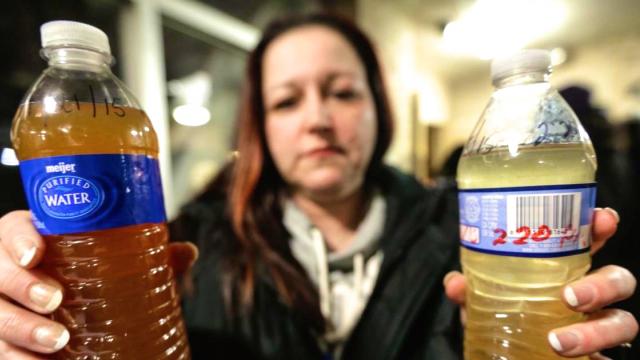Warm water fuels storms, whether summer hurricanes or winter blizzards. As a major winter snowstorm looks set to race up the East Coast this weekend, take a look at how warm the Atlantic water is right now:
Will any of the media coverage mention climate change, or will we spend another winter wrapping ourselves in a blanket of denial?
Tuesday, January 19, 2016
Monday, January 18, 2016
Don't Spend the Extra Money on Grassfed Milk
 Organic Valley Grassfed Milk recently hit the shelves of my local Market Basket, retailing for $1 more per half-gallon than standard organic milk. Since I'm a strange person who can't go grocery shopping without coming home with a research project, I wanted to see if it was actually worth the extra money.
Organic Valley Grassfed Milk recently hit the shelves of my local Market Basket, retailing for $1 more per half-gallon than standard organic milk. Since I'm a strange person who can't go grocery shopping without coming home with a research project, I wanted to see if it was actually worth the extra money.If you're buying milk, it's worth it to buy organic, and Organic Valley is one of the better national brands. But is it worth paying that much more for grassfed milk?
The short answer is no:
- Grassfed cows seem to be no less destructive to the environment than standard cows
- The evidence grassfed milk is healthier is pretty limited. It's a bit of a Rorchach - if you're inclined to believe grassfed is healthier, you'll find evidence to back you up. If you're more skeptical, you'll wonder if it's worth paying 25 percent more just for a slightly better omega-6 to omega-3 ratio.
- Organic milk is already better for you and the environment than standard milk, and whole milk is better for you than you think
- If you really want to cut the environmental impact of your milk drinking, switch to soy
If you have $1 a week to help yourself & the planet, I'd rather you switch to clean electricity.
Friday, January 15, 2016
Michigan GOP Begs Big Government to Solve Flint Water Crisis
 After Michigan officials tried to cut corners and ended up turning Flint's water supply toxic, Gov. Rick Snyder is now asking the Obama administration to step in to help.
After Michigan officials tried to cut corners and ended up turning Flint's water supply toxic, Gov. Rick Snyder is now asking the Obama administration to step in to help.Whether it's the deficit, the Iraq war, climate change or any of a list of hundreds of other problems big and small, it's a pattern we see time after time:
- Elect Republicans who brashly slash regulations and public investments
- Beg Democrats to use big government to save them from the resulting disaster
Monday, January 11, 2016
2015's Most Popular Posts at The Green Miles
The top posts of 2015 by page views here at The Green Miles:
And since I haven't gotten to brag about him here yet, here's our family's 2015 addition: Harry the mini goldendoodle:
- Comcast's New "Power Save" X1 Boxes Still Waste Tons of Energy
- Parking Lot Historic, Solar Farm Not
- New England Coalition for Affordable Energy: The Latest Fracked Gas Pipeline Front Group
And since I haven't gotten to brag about him here yet, here's our family's 2015 addition: Harry the mini goldendoodle:
Friday, January 8, 2016
"Market Forces" Aren't Boosting SUVs - Congress is Subsidizing Them
With gas prices plummeting below $2 a gallon, SUV and pickup sales are skyrocketing while sales of fuel-efficient and electric cars stall. The conventional wisdom among auto writers is that greenie efforts to cut gas consumption are failing in the face of the Free Market:
It’s the classic battle between market forces and regulators. [...]It is completely false to call this a battle between “market forces and regulators.” The free market hasn’t kept the gas tax artificially low - Congress has done that.
Even if you’re a die-hard green car person—or at the very least, someone who sees the long-term value in weaning cars off fossil fuels, as I certainly can—you can see what a tough situation this is for automakers. Standards are forcing them to make cars that people may not necessarily buy, and that they may not necessarily profit from. But what’s the alternative, the government backs off on making cars more efficient? That’s not likely to happen anytime soon.
Congress hasn't raised the federal gas tax in more than 20 years. Since it's a set rate of 18.4 cents a gallon that's not indexted to inflation, the tax has effectively fallen 34 percent since 1993. It’s now totally insufficient even to cover the costs of building & maintaining highways, never mind the social costs of burning gas, from local air pollution to global warming.
That low gas tax acts as a subsidy for SUVs and a disincentive for buying electric cars, one it has nothing to do with the free market and everything to do with oil companies’ friends in Congress.
On top of that, the Obama administration has adopted a drill baby drill stance, with active US oil rigs more than doubling under his watch. Again - regulators, not "market forces," putting a thumb on the scale for flooding the market with cheap gas.


